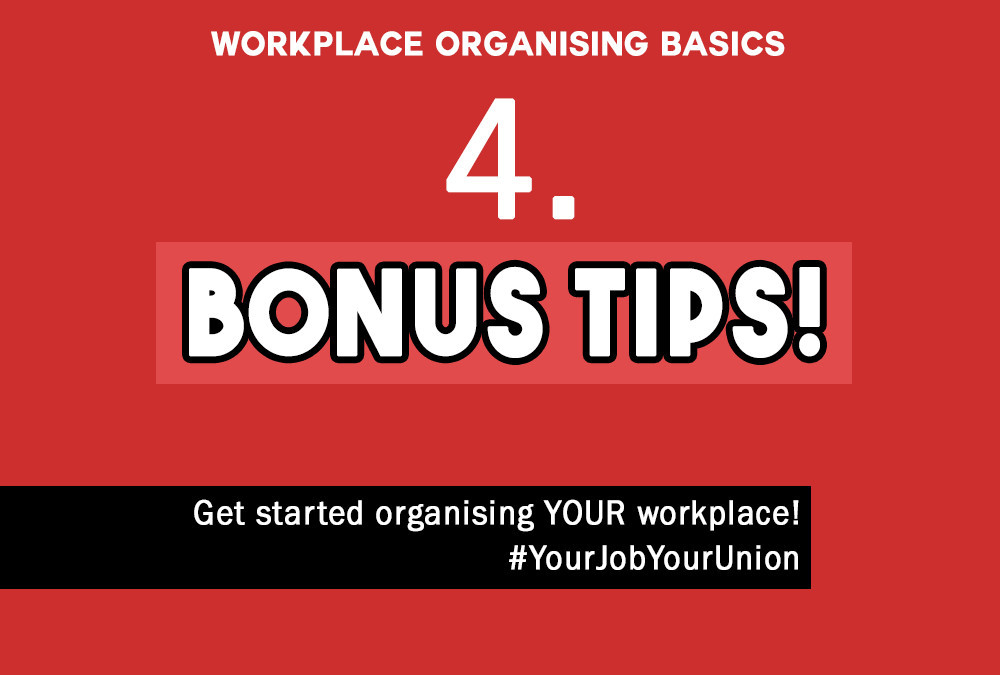The final article in our miniseries about the basics of workplace organising. Below is a list of additional hints and tips from experienced organisers. They should nicely compliment the organising method that you have learned from the previous pieces.
First, DO NO HARM!
This is the Hippocratic Oath for organisers. You are dealing with your own and your colleagues’ livelihoods. Be patient, do not take unnecessary risks.
Keep a DIARY!
Be consistent, be on time, and do exactly what you say you will do. Do not take on too much work for yourself, and do not make promises you cannot keep. It is better to work a little bit slower than to rush around and leave things unfinished.
Get people active.
Workers develop and grow confidence through activity. Is someone interested? Have a small task ready they can do (see our previous pieces about mapping and one-to-ones for ideas.) Do not patronise, but do not always presume they know exactly what to do either. Start with small, easy tasks and scale up.
Take co-workers where they are at.
Listen to workers and see where they are coming from. Do not presume to know their opinions and do not presume to know the reasons for them. Try not to totally write people off if they’re bad on something; chances are they can be moved…
However, you do not have to put up with bigotry or other abusive behaviour. If a colleague is being disrespectful, you could ask if a colleague who gets along with them can talk to them about it. Otherwise, it really is not worth the stress, move on and concentrate on better workers.
There is “recognition,” and there is RECOGNITION !
Being the official bargaining unit with “formal recognition” means literally nothing if workers cannot enforce it. However, if you are trading problems in exchange for better conditions and you have got your boss sweating, you are being recognised!
An Injury to One is an Injury to All.
The aim is to shift the balance of power from the boss to the workers. Helping someone with an individual case such as a disciplinary is important, but it will not change conditions overall. The boss needs to know an individual problem relates to everyone and that all of you will all cause trouble until it is resolved.
Be prepared for setbacks.
It will not always go to plan, but that’s okay. Be patient; workers, bosses, and opportunities come and go. Something out of the blue might tip the balance in your favour. Remember to keep inoculating so that setbacks are less harmful.
Be positive!
Have a sense of humour! Try to make organising a pleasant alternative to work itself. All workers know a lot about how grim the situation is, but there is no point dwelling on it. Try to be positive; your vision, humour, and conviction can convince workers that you all can win.
Organise the working class, not the Left.
When you are drawing up your social map, you can note whether someone has left-wing politics but there is not much to be gained from it. Certainly do not recruit a worker to the workplace organising team or the IWW merely on the basis of their leftist identity. The ‘apolitical’ or conservative-minded person you least expect might end up being a superb organiser, while the person who talks a big game might be bloody useless!
Quit the ideological bickering!
Similarly, do not get caught up in political / ideological / historical tiffs. Demonstrate your methodology through your activity. This is a general point for all organisers and activists; what Lenin or Kropotkin said on this or that means nothing if there is no organising going on!
Be specific.
Work towards clear, attainable goals with benchmarks and paths to success. Vague goals like “raising awareness” are pretty immeasurable. Organise around things that make people’s lives better. In addition, when you have clear goals it is easier to know what you have and have not achieved; take stock and enjoy the victory when it comes!
Build up and respect the collective process.
Work through disagreements together, even if it takes time and reflection. Plan things collectively. Organising teams are strong when they have a plethora of knowledge, experiences, and perspectives. Likewise, do not be afraid to disagree, just try not to be a dick about it!
Protests are naff.
At worst, they are depressing and disempowering acts of mass-begging. At best, they tend to preach to the converted and rarely engage a different audience. Do not fall into the trap of endless ‘protest hopping.’ There are plenty of possible direct actions you can do instead!
Remember to log-off!
Do not rely on social media to organise; your communications end up relying on algorithms and you might now know who has seen which message. Set up phone-trees, email lists, knock on doors (maybe not in a pandemic). Try the IWW’s own Wobchat or the Interwob Forum. Ultimately, nothing beats speaking to people directly, face to face!
—
Organizing.work have published a really useful guide of common mistakes organisers make, and what you should do instead. Check it out!
PREVIOUS: start an organising team!
Join the IWW and reach out to the organising department and your local branch for support!
